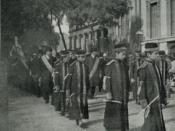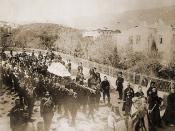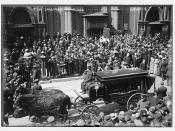Diverse funerary and burial customs can be found throughout the world. Among these customs, many are directly influenced by religion. In many cultures religion plays a vast importance in the lives of those it encompasses and how we view and cope with death. This aspect of religion is ever so prevalent in Judaism. Although, all funerals have different procedures and customs influenced by religion, Judaism is no exception to this. Despite the numerous customs found in the world today, Jewish customs are unique from the rest. In fact, Jewish funeral procedures are directly influenced by religion and Jewish laws govern customs regarding funerals and mourning. In order to understand the process of a Jewish funeral, we must examine all aspects of the funeral and burial.
Upon death, a Jew is never left alone until after the burial. This process known as Shemira is based on the principle of honoring the dead.
Those who stay with the body are known as the shomerim or guards. During this time, the eyes of the deceased are closed; candles are lit and placed around the body. Also during this time, the shomerim are not able to drink or eat around the body. The reason for this is because it is seen as mockery to the dead since they are no longer able to do such thing. The body is clothed in a white linen shroud called a tachrich. These shrouds are traditionally sewn with no knots or pockets. The reason for the absence of pockets is to symbolize the fact that they can't take anything with them. Typically, the body is watched over by the "holy society" known as Chevra Kaddisha. This group watches over the dead, washes the body, and prepares it for burial.
It is Jewish tradition that the body be buried...


